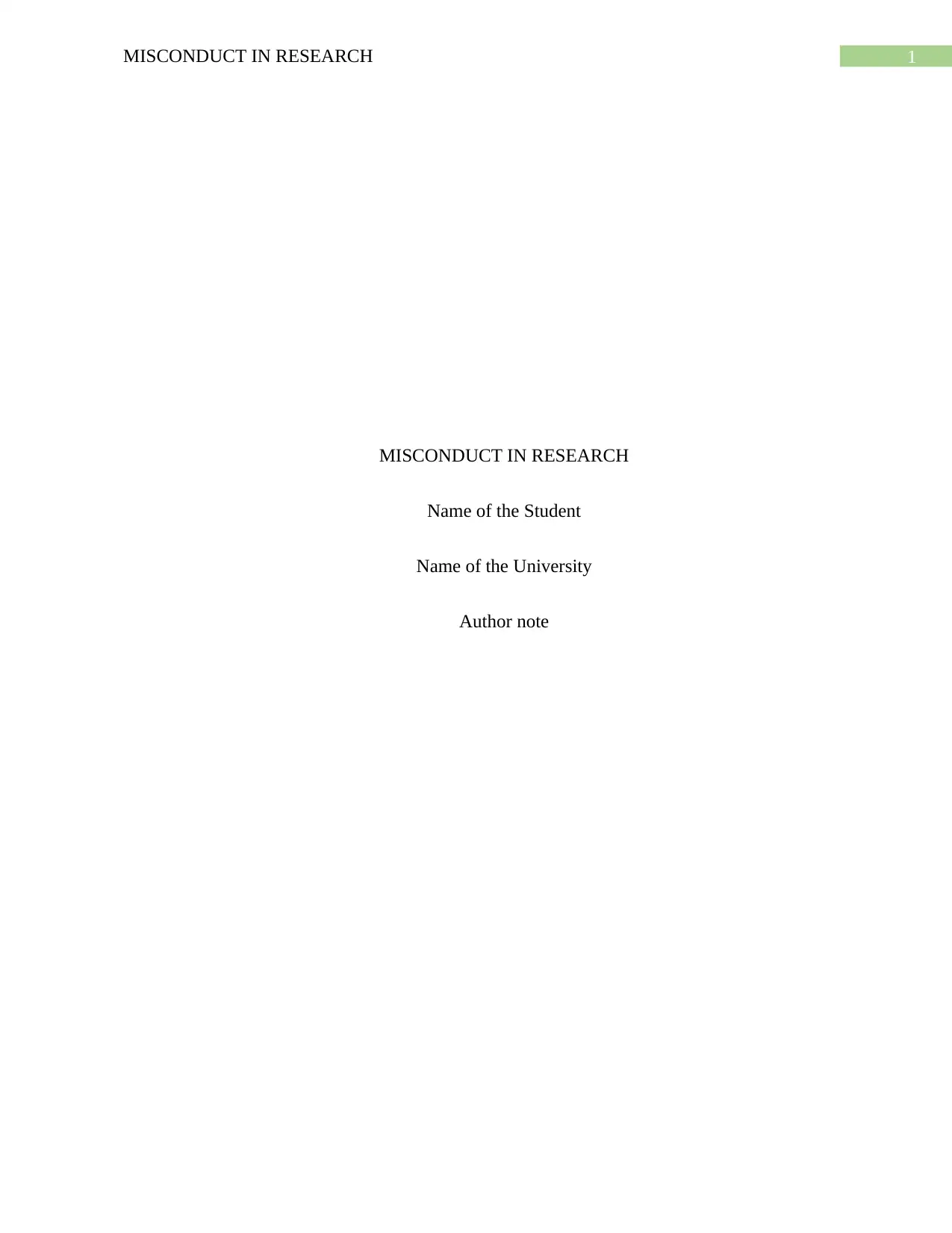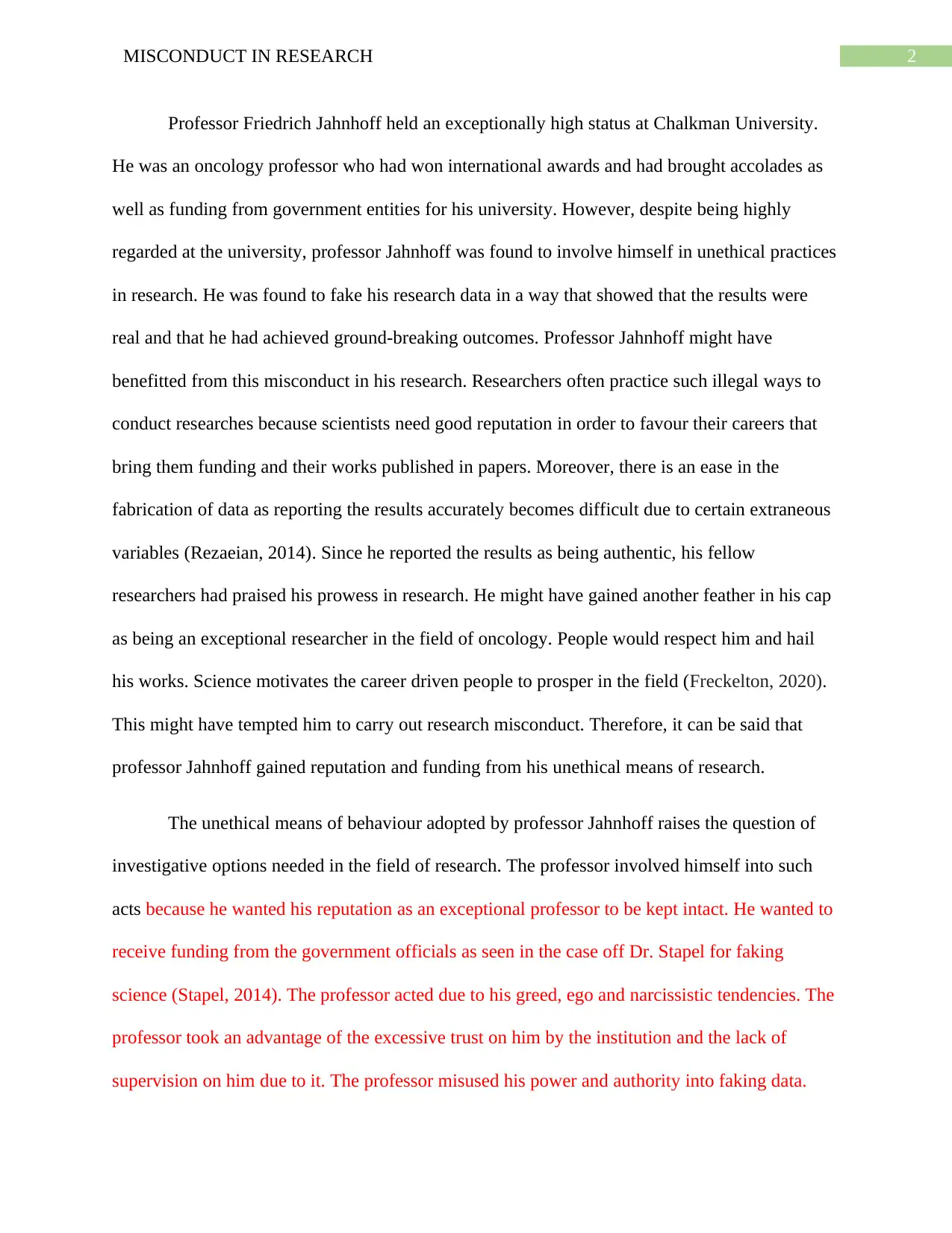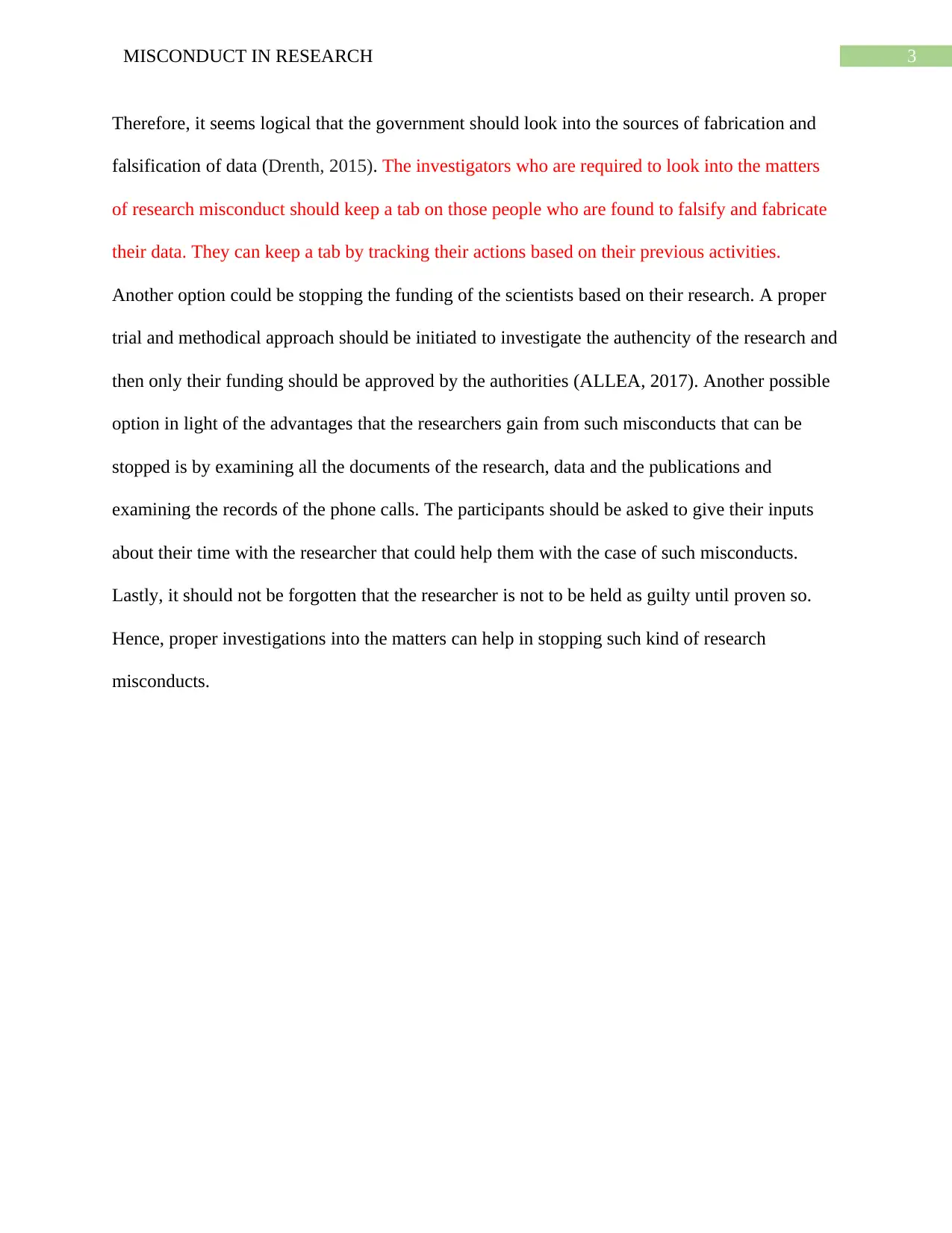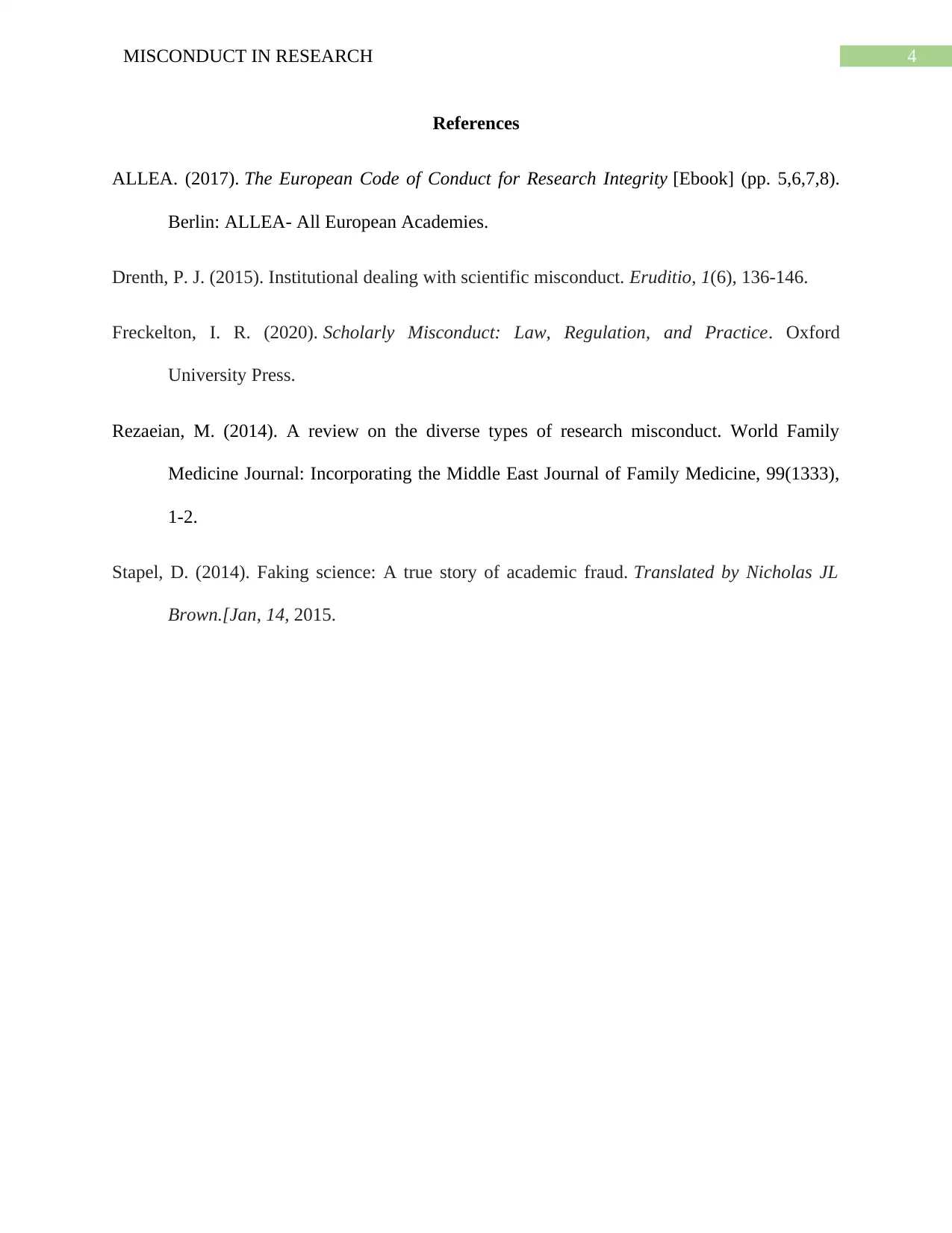Research Misconduct Report: Analysis of Professor Jahnhoff's Case
VerifiedAdded on 2022/08/12
|4
|765
|17
Report
AI Summary
This report analyzes a case of research misconduct involving Professor Friedrich Jahnhoff at Chalkman University, focusing on his unethical practices in oncology research. The professor fabricated data to achieve groundbreaking outcomes, potentially gaining reputation, funding, and career advancement. The report explores the advantages Professor Jahnhoff may have gained from his misconduct and examines investigative options to address such unethical behavior, including scrutinizing data sources, tracking researchers' activities, and examining research documentation. The analysis references relevant literature and considers the importance of thorough investigations to prevent future instances of research fraud.

1MISCONDUCT IN RESEARCH
MISCONDUCT IN RESEARCH
Name of the Student
Name of the University
Author note
MISCONDUCT IN RESEARCH
Name of the Student
Name of the University
Author note
Paraphrase This Document
Need a fresh take? Get an instant paraphrase of this document with our AI Paraphraser

2MISCONDUCT IN RESEARCH
Professor Friedrich Jahnhoff held an exceptionally high status at Chalkman University.
He was an oncology professor who had won international awards and had brought accolades as
well as funding from government entities for his university. However, despite being highly
regarded at the university, professor Jahnhoff was found to involve himself in unethical practices
in research. He was found to fake his research data in a way that showed that the results were
real and that he had achieved ground-breaking outcomes. Professor Jahnhoff might have
benefitted from this misconduct in his research. Researchers often practice such illegal ways to
conduct researches because scientists need good reputation in order to favour their careers that
bring them funding and their works published in papers. Moreover, there is an ease in the
fabrication of data as reporting the results accurately becomes difficult due to certain extraneous
variables (Rezaeian, 2014). Since he reported the results as being authentic, his fellow
researchers had praised his prowess in research. He might have gained another feather in his cap
as being an exceptional researcher in the field of oncology. People would respect him and hail
his works. Science motivates the career driven people to prosper in the field (Freckelton, 2020).
This might have tempted him to carry out research misconduct. Therefore, it can be said that
professor Jahnhoff gained reputation and funding from his unethical means of research.
The unethical means of behaviour adopted by professor Jahnhoff raises the question of
investigative options needed in the field of research. The professor involved himself into such
acts because he wanted his reputation as an exceptional professor to be kept intact. He wanted to
receive funding from the government officials as seen in the case off Dr. Stapel for faking
science (Stapel, 2014). The professor acted due to his greed, ego and narcissistic tendencies. The
professor took an advantage of the excessive trust on him by the institution and the lack of
supervision on him due to it. The professor misused his power and authority into faking data.
Professor Friedrich Jahnhoff held an exceptionally high status at Chalkman University.
He was an oncology professor who had won international awards and had brought accolades as
well as funding from government entities for his university. However, despite being highly
regarded at the university, professor Jahnhoff was found to involve himself in unethical practices
in research. He was found to fake his research data in a way that showed that the results were
real and that he had achieved ground-breaking outcomes. Professor Jahnhoff might have
benefitted from this misconduct in his research. Researchers often practice such illegal ways to
conduct researches because scientists need good reputation in order to favour their careers that
bring them funding and their works published in papers. Moreover, there is an ease in the
fabrication of data as reporting the results accurately becomes difficult due to certain extraneous
variables (Rezaeian, 2014). Since he reported the results as being authentic, his fellow
researchers had praised his prowess in research. He might have gained another feather in his cap
as being an exceptional researcher in the field of oncology. People would respect him and hail
his works. Science motivates the career driven people to prosper in the field (Freckelton, 2020).
This might have tempted him to carry out research misconduct. Therefore, it can be said that
professor Jahnhoff gained reputation and funding from his unethical means of research.
The unethical means of behaviour adopted by professor Jahnhoff raises the question of
investigative options needed in the field of research. The professor involved himself into such
acts because he wanted his reputation as an exceptional professor to be kept intact. He wanted to
receive funding from the government officials as seen in the case off Dr. Stapel for faking
science (Stapel, 2014). The professor acted due to his greed, ego and narcissistic tendencies. The
professor took an advantage of the excessive trust on him by the institution and the lack of
supervision on him due to it. The professor misused his power and authority into faking data.

3MISCONDUCT IN RESEARCH
Therefore, it seems logical that the government should look into the sources of fabrication and
falsification of data (Drenth, 2015). The investigators who are required to look into the matters
of research misconduct should keep a tab on those people who are found to falsify and fabricate
their data. They can keep a tab by tracking their actions based on their previous activities.
Another option could be stopping the funding of the scientists based on their research. A proper
trial and methodical approach should be initiated to investigate the authencity of the research and
then only their funding should be approved by the authorities (ALLEA, 2017). Another possible
option in light of the advantages that the researchers gain from such misconducts that can be
stopped is by examining all the documents of the research, data and the publications and
examining the records of the phone calls. The participants should be asked to give their inputs
about their time with the researcher that could help them with the case of such misconducts.
Lastly, it should not be forgotten that the researcher is not to be held as guilty until proven so.
Hence, proper investigations into the matters can help in stopping such kind of research
misconducts.
Therefore, it seems logical that the government should look into the sources of fabrication and
falsification of data (Drenth, 2015). The investigators who are required to look into the matters
of research misconduct should keep a tab on those people who are found to falsify and fabricate
their data. They can keep a tab by tracking their actions based on their previous activities.
Another option could be stopping the funding of the scientists based on their research. A proper
trial and methodical approach should be initiated to investigate the authencity of the research and
then only their funding should be approved by the authorities (ALLEA, 2017). Another possible
option in light of the advantages that the researchers gain from such misconducts that can be
stopped is by examining all the documents of the research, data and the publications and
examining the records of the phone calls. The participants should be asked to give their inputs
about their time with the researcher that could help them with the case of such misconducts.
Lastly, it should not be forgotten that the researcher is not to be held as guilty until proven so.
Hence, proper investigations into the matters can help in stopping such kind of research
misconducts.
⊘ This is a preview!⊘
Do you want full access?
Subscribe today to unlock all pages.

Trusted by 1+ million students worldwide

4MISCONDUCT IN RESEARCH
References
ALLEA. (2017). The European Code of Conduct for Research Integrity [Ebook] (pp. 5,6,7,8).
Berlin: ALLEA- All European Academies.
Drenth, P. J. (2015). Institutional dealing with scientific misconduct. Eruditio, 1(6), 136-146.
Freckelton, I. R. (2020). Scholarly Misconduct: Law, Regulation, and Practice. Oxford
University Press.
Rezaeian, M. (2014). A review on the diverse types of research misconduct. World Family
Medicine Journal: Incorporating the Middle East Journal of Family Medicine, 99(1333),
1-2.
Stapel, D. (2014). Faking science: A true story of academic fraud. Translated by Nicholas JL
Brown.[Jan, 14, 2015.
References
ALLEA. (2017). The European Code of Conduct for Research Integrity [Ebook] (pp. 5,6,7,8).
Berlin: ALLEA- All European Academies.
Drenth, P. J. (2015). Institutional dealing with scientific misconduct. Eruditio, 1(6), 136-146.
Freckelton, I. R. (2020). Scholarly Misconduct: Law, Regulation, and Practice. Oxford
University Press.
Rezaeian, M. (2014). A review on the diverse types of research misconduct. World Family
Medicine Journal: Incorporating the Middle East Journal of Family Medicine, 99(1333),
1-2.
Stapel, D. (2014). Faking science: A true story of academic fraud. Translated by Nicholas JL
Brown.[Jan, 14, 2015.
1 out of 4
Your All-in-One AI-Powered Toolkit for Academic Success.
+13062052269
info@desklib.com
Available 24*7 on WhatsApp / Email
![[object Object]](/_next/static/media/star-bottom.7253800d.svg)
Unlock your academic potential
Copyright © 2020–2026 A2Z Services. All Rights Reserved. Developed and managed by ZUCOL.


